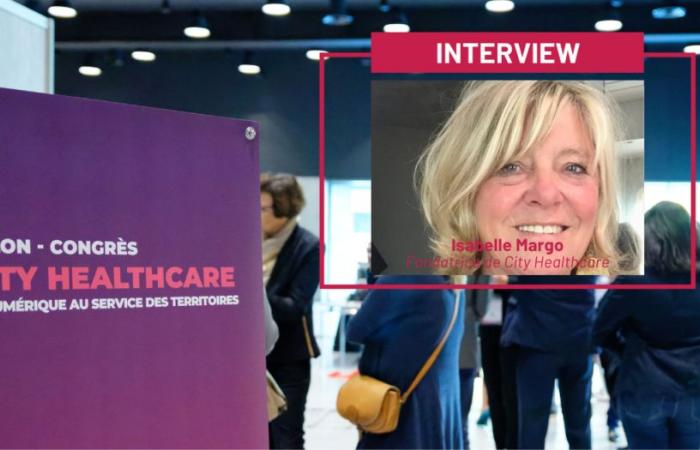City Healthcare, a trade fair dedicated to e-health in the regions, will be held in Nantes on October 3, 2024. Eight years after its launch, the organizers of this event intend to stay on course: “bringing together all e-health stakeholders, sharing uses and initiatives that are emerging in the regions”. An update on this edition entitled “Digital technology for better care”, with Isabelle Margo, founder of the event.
Interview by Géraldine Bouton
After Nancy for its first editions, City Healthcare is taking place in Nantes for the second consecutive year. Reporting on digital health in the regions is part of the DNA of this event. Why?
Isabelle Margo: Our leitmotif remains the same: “bring together all e-health stakeholders, share the uses and initiatives that are emerging in the territories”. The approach is to reflect a plural reality. Depending on the typology of the territories, the dynamics are not the same and the practices or initiatives differ.
This is the light we want to give. This year again, we are fortunate to be supported by both national authorities and local stakeholders such as the CHU, the gerontology center, etc.
If the event takes place in Nantes, it highlights initiatives carried out in Normandy, Brittany, etc. It would be great to make this show a tool that travels. We have requests in this regard. Discovering and knowing a territory takes time… It takes several editions. Moreover, for this second edition in Nantes, there will be even more local stakeholders than last year.
Clinical research, cybersecurity, the digital revolution in pharmacies, remote monitoring… The program is dense. How did you design it?
IM: Each edition leads us to explore all the environments that make sense in the evolution of digital health by taking a close interest in the uses and the way in which the contours of e-health are thought out.
The question of uses is essential. How do stakeholders appropriate digital tools in health is a central question? For example, we are devoting a round table to the digital revolution in pharmacies. How does it happen? What are the obstacles and success factors? E-health must become a concrete subject if we want stakeholders to appropriate it for the benefit, in finepatients.
“Stimulating innovation in digital health” is one of the major themes of this 9e edition. Can you tell us more?
IM: The idea came from work carried out by the GRADeS (Regional Group for Supporting the Development of E-Health, editor’s note) of the Pays de la Loire. They produced a map of digital innovation in health in the region. Who is innovating? How? Where? Who should I turn to in my area? Based on this approach, we invited start-ups and large groups to learn about their progress and their strategy in terms of innovation. A focus will be made on third places for digital experimentation in health. There are six in the Grand Ouest. Few people know what they are, even though they are open to companies to support them in their projects…
The focus will also be on mental health and healthy aging. What can digital technology do on these topics?
IM: Mental health is a widely shared concern that Nantes Métropole has taken up. Line Farah, Director of the Major Digital Challenges for Mental Health and Ageing Well at the Digital Health Delegation (DNS), will provide insight into how digital technology can help identify, support or resolve mental health issues.
This will be an opportunity to present the SESAME project – for Team Care in Mental Health – from the Montaigne Institute. This initiative aims to improve the screening and management of common mental disorders in general medicine.
Finally, on the subject of healthy aging thanks to digital technology, we will question the factors of success based on examples of concrete solutions and initiatives. I am thinking in particular of the Living Lab Aging and Vulnerabilities, a system for experimentation, evaluation, research and development of prevention solutions and support for situations of frequent vulnerability in old age or the anti-fall plan of the Pays de la Loire.
The creation of this show is also due to the observation that e-health players were not meeting. Have the lines moved?
IM: Eight years ago, e-health was a testing ground. Today, everyone has understood the issues and the interest. Several disruptions have accelerated the process, notably the health crisis. The national strategy has become clearer with the Ségur du numérique. It is better identified and finds translations in the regions where the network is strengthening. For example, the responses that the territorial professional health communities (CPTS) provide to the needs of their territories also involve digital technology.
Digital training has become mandatory for health students. In short, there is a gradual appropriation by structures, users, citizens and health professionals. The health sector remains a complex environment. Progress is made in small steps and at different rates depending on the sectors or medical disciplines. There is still a long way to go, but things are moving forward. And we are here to observe and support what is happening on the ground.
Practical information
City Healthcare Show, October 3 at the Cité des Congrès in Nantes, from 9 a.m. to 5 p.m.
Registration and program.






